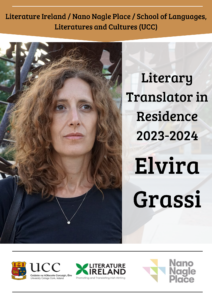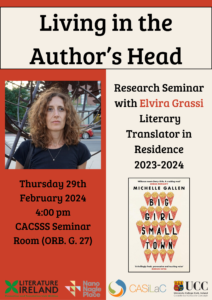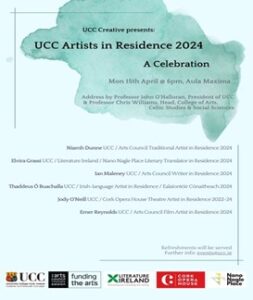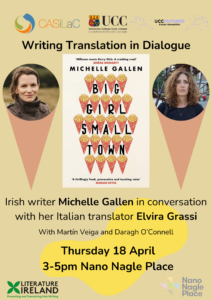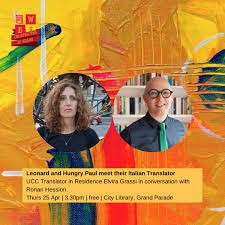TRANSLATOR IN RESIDENCE REPORTS
- LITERARY TRANSLATOR IN RESIDENCE REPORT 2023-2024 - ELVIRA GRASSI
Now that I’m back home, I’d like to reflect a little on my time in Cork and what I hope to keep from this amazing time.
When I found out that I had been offered the translation residency at UCC, I knew it would be an opportunity I would enjoy, but I didn’t expect there to be so many interesting events and meetings for me to get involved in. All the people I met at UCC were lovely, kind and knowledgeable, and I felt very well supported. My time as a Translator in Residence gave me space to think creatively about what I love to do most, and to enjoy the cultural immersion and rich intellectual collaborations with other translators and scholars. It’s been such a precious, productive and peaceful time.
So I would like to thank Literary Ireland (Sinéad Mac Aodha and her kind team), UCC and the Centre for Advanced Studies in Languages and Cultures (Martín Veiga, Head of the Spanish, Portuguese and Latin American Studies Department, and Daragh O’Connell, Head of the Italian Department), and Nano Nagle Place (Susannah Ahern and all the staff) for having me and cuddling me.
During my residency (from mid–February to early May 2024), I devoted myself to translating Big Girl, Small Town by Michelle Gallen for publication by the Italian publisher Keller Editore. While working on this project, I had access to a wide range of facilities at the university, including the Boole Library, contact with academic staff and people working on a variety of projects, and free access to a range of interesting events at the university (workshops on many different topics, talks and readings by Irish novelists, music events, etc.). I was given a workspace in the Italian department, where I worked in close and fruitful proximity to Daragh O’Connell, a person of immense cultural and literary sensitivity, and the PhD students, with whom I became good friends.
I took part in some events while I was in Cork. The first was a talk for the students of the MA in Translation Studies, during which I shared my expertise and my path to becoming a literary translator, offering advice on how to get into the publishing world and an overview of the Italian book market for translation. In the second part of the event, I focused on the linguistic challenges of translating a book full of vernacular and dark humour, with a highly original and brilliant voice, such as Michelle Gallen’s novel, and I explained my approach to the text and its peculiarities.
In addition to this workshop, I gave a couple of lessons to the Italian students on the MA in Translation Studies about translating fiction in general and this novel in particular, and we practised some sections of the book together.
I also attended an event called The Celebration Day in the Aula Maxima at UCC, which brought together all the artists in residence and was chaired by Jools Gilson, Professor of Creative Practice and Director of UCC Creative. The artists were: Niamh Dunne (musician), Ian Maleney (writer), Jody O’Neill (playwright), Thaddeus Ó Buachalla (Irish-language author), Emer Reynolds (director). During my presentation I talked about my translation project – why in recent years I chose to translate Northern Irish novels (I’ve also translated Milkman and No Bones by Anna Burns) and why I love doing it – and I read a few sections from my translation after Daragh O’Connell had read the same sections from the original text. Listening to all the other artists in residence talk about their work was so inspiring.
Another event I really enjoyed was the talk/reading I did with Michelle Gallen in Nano Nagle Place. It was hosted by Daragh O’Connell and Martín Veiga. I really love Michelle’s writing and her as a person, and it was a privilege to have the chance to meet her in person, to talk about the novel (but not only) with her and to hear about her writing practice, interests and influences, to share our points of view about her writing and Irish writing in general and her use of comic and vernacular. She was also very generous, supportive and curious about my approach to translation, and helped me a lot by answering my questions about specific words or phrases in the parts of the book I’ve translated so far.
I was also invited to the Cork World Book Fest with the Irish writer based in Dublin Rónán Hession, whose debut novel Leonard and Hungry Paul I’d previously translated into Italian for Keller Editore. We discussed his writing process and mine, what inspired his gentle story with such quiet, atypical characters, the challenges I faced in translating it, and we reflected on the importance of translation in promoting a more inclusive literary canon.
During the Cork World Book Fest, I had the opportunity to attend so many interesting panels on writing (I listened to Paul Lynch, Aingeala Flannery, Eimear Ryan, Danielle McLaughlin, Danny Denton, Clemens Meyer, Maggie Armstrong, Gemma Ruiz Palá), translation (Peter Bush, Katy Derbyshire), literary magazines (Banshee, Swerve, 4 Faced Liar, Waxed Lemon), scouting and literary agents, etc.
One of the privileges of my residency is that it allows for so many meetings and connections: for example, I had the opportunity to meet the previous translator in residence, Anna-Nina Kroll from Germany, a really lovely person. We spent some time together talking about translation in our own country and our reading tastes, and we had so much fun.
During my residency I also fulfilled one of my literary dreams: to meet Anna Burns. We met in Dublin (along with Michelle Gallen) and spent a wonderful day together that I will never forget.
I stayed in a wonderful apartment at Nano Nagle Place, with a huge window in the kitchen–living room overlooking the city in all its beauty. It was the perfect place – with its garden, museum, bookshop and delicious Good Day Deli – to be and to concentrate on my translation.
I would like to thank, in no particular order, Martín Veiga (my point of reference), Sinéad Mac Aodha, Daragh O’Connell, Jacopo Turini, Barbara Siller, Marco Amici, Chiara Valcelli, Bruna Lorenzin, Giulia Bernuzzi, Elsina Caponetti, Dario Galassini, Francesca Nieddu, Chiara Giuliani, Silvia Ross, Mark Chu, Tommaso Verga, Noreen Kane, Leonor de Oliveira, Giulia Castronuovo, Martina Montanaro, Mei Emilia Volpelli, Jools Gilson, Maedhbh NicLochlainn, Gillian Hennessy, Keith Payne, Patricia Looney and all the other kind people I met during these months.
Finally, I would like to thank Ireland and Cork City for being so beautiful, characteristic and warm to me. I will be back soon.
- 2022-2023 LITERARY TRANSLATOR IN RESIDENCE REPORT – ANNA-NINA KROLL
-
Anna-Nina Kroll is a literary translator from Essen, Germany. She holds a degree in Literary Translation from Düsseldorf University and has been working full time for more than 10 years. During this time, she has translated over 30 works of fiction, non-fiction and children’s literature from English to German including authors like Patricia Highsmith, John Irving, Carmen Maria Machado, and Dick Bruna. Anna-Nina was appointed Translator in Residence by Literature Ireland and Trinity Centre for Literary and Cultural Translation in 2020 and has translated all of Donal Ryan’s work, Louise Nealon’s Snowflake and Anna Burns’ No Bones. Her translation of Burns’ Man Booker-winning Milkman was awarded the Förderpreis zum Straelener Übersetzerpreis in 2021.
This report provides an overview of my tenure as Literary Translator in Residence at University College Cork, a position created by the School of Languages, Literatures and Cultures at UCC in partnership with Literature Ireland in 2020.
As Literary Translator in Residence, my responsibilities encompassed a range of activities that contributed to the academic and literary community at UCC and in Cork City while at the same time allowing me to work on my translation of Donal Ryan’s Strange Flowers. I was provided with a work space in the German Department where I worked in close proximity to a great number of language experts from all parts of the School of Languages, Literatures, and Cultures who were happy to help with any questions I had.
I was invited to share my expertise by giving a presentation on literary translation and the translation-heavy German book market. Subjects of my talk for the students of the MA in Translation Studies included the publishing process from original text to finished translation, networking, contracts, payment, and royalties. I also offered advice on how to get started as a literary translator and how to become visible to publishers with little to no practical experience.
In addition to this presentation, I conducted two interactive sessions with Translation Studies students and Dr Eibhear Walshe, writer and Director of Creative Writing in the School of English. In his presence, we worked on a translation of excerpts from his historical novel The Trumpet Shall Sound which gave us valuable insights into his writing process and helped us along on the way to an adequate rendering in German. In showing the students my tools and commenting on my decisions I was able to make the translation process somewhat more transparent to them.
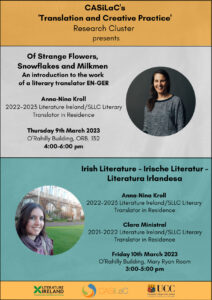 Another highly interesting event included my predecessor as Literary Translator in Residence, Clara Ministral, who translates from English into Spanish. This talk gave us a chance to connect, to compare experiences, and to discuss Irish literature, its significance and perception in Spain and Germany as well as its translation into our respective languages. Both of us are more than happy in our profession but agreed that it sometimes gets a little too romanticized, so in addition to the joys we also talked about the challenges and pressures and the drastically low payment we receive. The audience was a mix of students, staff and professional translators which made for a lively discussion.
Another highly interesting event included my predecessor as Literary Translator in Residence, Clara Ministral, who translates from English into Spanish. This talk gave us a chance to connect, to compare experiences, and to discuss Irish literature, its significance and perception in Spain and Germany as well as its translation into our respective languages. Both of us are more than happy in our profession but agreed that it sometimes gets a little too romanticized, so in addition to the joys we also talked about the challenges and pressures and the drastically low payment we receive. The audience was a mix of students, staff and professional translators which made for a lively discussion.
In a remarkable coincidence we discovered that Dr Chris Williams, currently Head of the College of Arts, Celtic Studies and Social Sciences at UCC, had edited The Richard Burton Diaries in one of his previous stations – one of my very first commissioned co-translations. The 650 pages of the original, of which I translated approximately 120, were divided up between six translators due to time constraints. Dr Williams gave some fascinating insights into the editing and publishing process of the book and his thorough research on the famous actor’s literary quotations and allusions, the result of which were footnotes that weren’t only enlightening for the reader but also saved the translators many a minute of searching for the translated equivalents.
In my role as Translator in Residence I was further invited to be part of Cork World Book Fest together with writer Louise Nealon, whose debut novel Snowflake I translated the previous year. Louise and I compared our creative processes and our shared generational background, read from the English and German versions of the book, and answered audience questions. Despite the relatively early hour of our talk, the seats at Cork City Library were filled and audience feedback was more than positive.
For the fin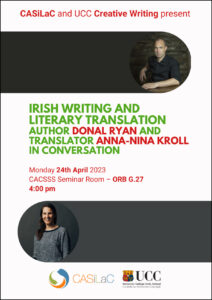 al public event of my time at UCC, Donal Ryan joined Dr Martín Veiga, Head of the Department of Spanish, Portuguese and Latin American Studies, Dr Eibhear Walshe and myself. We discussed Donal Ryan’s career, his writing process, the experience of being translated, and his relationship with his numerous translators. I was happy to talk about the blissful familiarity that comes from translating the same author for many years and to commend his brilliantly helpful answers to my long list of questions for every new book. We finished the afternoon with a reading from Strange Flowers, first in Donal’s English and then in my German draft translation.
al public event of my time at UCC, Donal Ryan joined Dr Martín Veiga, Head of the Department of Spanish, Portuguese and Latin American Studies, Dr Eibhear Walshe and myself. We discussed Donal Ryan’s career, his writing process, the experience of being translated, and his relationship with his numerous translators. I was happy to talk about the blissful familiarity that comes from translating the same author for many years and to commend his brilliantly helpful answers to my long list of questions for every new book. We finished the afternoon with a reading from Strange Flowers, first in Donal’s English and then in my German draft translation.
In between my professional commitments, I took the opportunity to explore the city and its surroundings. Seeing and experiencing the natural beauty and rich history of the South West of Ireland helped further my knowledge of the cultural context of Irish literature. I went on hikes in Ballycotton, Kinsale, Gougane Barra, Sheep’s Head, Killarney and the Dingle Peninsula, enjoying the beautiful nature of the island. Furthermore, I travelled to Limerick for the Kate O’Brien Festival where Donal Ryan read from his latest novel The Queen of Dirt Island and Doireann Ní Ghríofa recited her poems in Irish and English. I then attended the Kate O’Brien Award Ceremony for best fiction debut by a female Irish author, and at Cúirt International Festival of Literature in Galway I sat in on events showcasing emerging talents and even had the unexpected chance to meet my American author Carmen Maria Machado, whose books I had translated and whom I had never met before.
Immersing oneself in a foreign culture also means celebrating its traditions, so for the first time ever, I experienced Pancake Tuesday and, more importantly, Saint Patrick’s Day. The parade and surrounding festivities provided me with a memorable glimpse into Irish customs and the country’s cultural heritage. Other enriching cultural activities included museum visits (the Glucksman, Nano Nagle Place, Cork Public Museum, the Blasket Centre), a comedy show at the Cork Opera House, concerts, films and film festivals at the Triskel Arts Centre and Gate cinema and, of course, a taste or two of the vibrant pub scene in Cork.
The cultural life at UCC is equally as vibrant. The 10-year anniversary celebration of the Creative Writing program, an event that featured esteemed authors, emerging talents and enthusiastic students, was a wonderful opportunity to celebrate literature, connect with like-minded people, and further relationships within the Irish literary community. What is more, I attended lunchtime concerts at the Aula Maxima, film screenings held by the German Department, and even the Ireland premiere of the brilliant documentary The Last Austrians, several book launches, one of which inspired me to give learning Irish another chance, and two events of the Reading Series organised by UCC Creative Writing: one with Writer in Residence Lisa Harding and the other with John Banville.
A highlight at the end of my residency was the 3rd annual Translation Studies Network of Ireland conference held at UCC which provided a platform for engaging discussions, presentations, and networking opportunities with fellow translators and researchers, enabling me to expand my knowledge in the field of translation studies, and establish and renew connections within the translation community.
My tenure as Literary Translator in Residence at University College Cork was a transformative experience filled with enriching experiences, cultural immersion, and professional as well as personal growth. It allowed me to contribute to the literary and academic community, engage in professional exchange, and deepen my understanding of Ireland and Irish culture. I am grateful for the experiences and the knowledge gained during my time at UCC which will undoubtedly shape my future endeavours as a translator. I would like to thank Literature Ireland, Martín Veiga, Barbara Siller, Rachel MagShamhráin, and everyone in the School of Languages, Literatures, and Cultures who gave me such a warm welcome and made my time in Cork as pleasant and inspiring as it was.
- LITERARY TRANSLATOR IN RESIDENCE REPORT 2021-2022 - CLARA MINISTRAL
The University College Cork/Literature Ireland Literary Translation Residency is the result of a partnership between the School of Languages, Literatures and Cultures and Literature Ireland, the national agency for the promotion of Irish literature abroad.
Originally scheduled to launch in 2020, the programme had to be postponed due to COVID-19, but the inaugural Literary Translator in Residence, Clara Ministral, was finally able to travel to Cork and start her 12-week residency in early February 2022.
Clara Ministral studied Translation and Comparative Literature and has been translating fiction and non-fiction from English to Spanish since 2008. During that time, she has also held other positions in the arts sector, both in the UK and in Spain, as well as working in commercial translation. Since 2018, she has overseen a mentoring scheme for emerging translators in Spain in collaboration with ACE Traductores, the Spanish Association of Literary Translators. Ever since coming across and subsequently translating Jan Carson’s novel The Fire Starters – winner of the European Union Prize for Literature for Ireland – Clara has been a keen proponent of Irish literature in the Spanish-speaking world. She has been one of the translators in Literature Ireland’s Talking Translations podcast series, as well as contributing to the organization’s inaugural series of literary translation summer workshops in 2021.
There were two principal strands to Clara’s residency at UCC. On the one hand, throughout her time in Cork she worked on promoting contemporary Irish literature among Spanish publishers. The opportunity to be in close proximity to the Irish cultural and literary scene, attending events (such as Cúirt International Festival of Literature and Cork World Book Fest) and establishing relationships with authors, literary agents, publishers and academics, allowed Clara to discover a wealth of extraordinary Irish works published in recent years. She went on to select six wonderful – and yet untranslated – novels by contemporary Irish authors with the potential to appeal to Spanish readers and worked on translation samples and pitches for submission to publishing houses in Spain. Although the fruits of her pitching might take some time to show, she is hopeful that her efforts will result in some of these literary works reaching a Spanish-speaking audience.
In parallel to this, an essential part of the residency was focused on bringing Clara’s practice as a professional literary translator into the day-to-day life of the School. As well as engaging in numerous interactions with members of the UCC community – which helped foster a better mutual understanding between the environments of academia and professional literary translation – she delivered a number of more formal activities for students (mostly, though not exclusively, those undertaking the MA in Translation Studies) and members of staff.
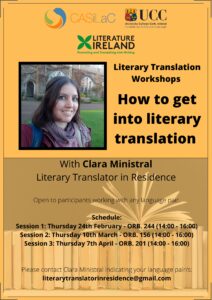 First among these was a series of three workshops tackling ‘how to get into literary translation’, which took place on 24th February, 10th March and 7th April. Well aware that starting in this field might seem difficult or even impossible to those unfamiliar with the publishing industry, Clara offered some highly practical tips and guidance on how and where to start.
First among these was a series of three workshops tackling ‘how to get into literary translation’, which took place on 24th February, 10th March and 7th April. Well aware that starting in this field might seem difficult or even impossible to those unfamiliar with the publishing industry, Clara offered some highly practical tips and guidance on how and where to start.
Workshop attendees learned how to compile a pitch for publishers (and got to prepare their own pitches), heard about useful avenues to explore when trying to get one's foot in the door – such as getting published in literary magazines and writing reader’s reports for publishers – and also familiarised themselves with some of the available opportunities for those seeking to develop a career in literary translation. Whilst painting a realistic picture of the publishing industry and the attendant difficulties of working as a literary translator, Clara was keen to dispel the myths that literary translation is never viable as a career and that it is a completely impenetrable sector for those outside of certain circles, instead encouraging attendees to try and break into the field through a number of realistic, practical steps that any translator can take. The workshop attendees’ diverse backgrounds, language pairs and interests made for stimulating discussions in the three sessions and it has been wonderful to hear that, after the end of the series, some of the participants have been putting what they learned into practice out there in the real world.
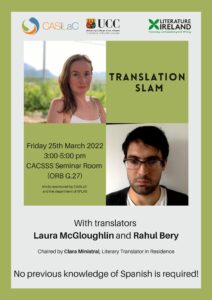 Secondly, two other professional literary translators, Laura McGloughlin and Rahul Bery, travelled to UCC on 25th March to participate in a translation slam organised and chaired by Clara. For this event, Rahul and Laura both prepared translations into English of the exact same literary text in Spanish, an extract from Ana Flecha Marco’s novel Piso compartido.
Secondly, two other professional literary translators, Laura McGloughlin and Rahul Bery, travelled to UCC on 25th March to participate in a translation slam organised and chaired by Clara. For this event, Rahul and Laura both prepared translations into English of the exact same literary text in Spanish, an extract from Ana Flecha Marco’s novel Piso compartido.
During the well-attended slam, all three translators discussed these different versions, looking at some of the challenges posed by the original text and the contrasting ways in which the two slammers had handled them. This was a fantastic opportunity to learn what really goes on ‘behind the scenes’ when translators work on a literary text and to discuss practical topics such as translating voice, dealing with puns and wordplay, and what to do when faced with ambiguity. It has also been very positive to learn that the texts produced are having a life beyond the slam, as several members of staff expressed interest in using these texts subsequently in their lessons (not only with students of translation or languages, but also with those pursuing creative writing courses).
Lastly, on 21st April Clara took part in a research seminar alongside the Galician poet and translator Daniel Salgado. Their presentations, and the animated discussion with attendees that followed, offered a fascinating contrast between translating books for a living and translating poetry mainly for pleasure. As she reiterated throughout her residency, Clara emphasised the idea of literary translation as a professional practice and the critical importance of fully recognising its more prosaic aspects (such as working conditions, financial considerations or legal issues) when discussing this sometimes overly romanticised activity.
As well as delivering these activities at UCC, Clara was invited to participate in an event at the Cork World Book Festival on 23rd April where she was paired with local author Billy O’Callaghan. This unusual format allowed the audience at the City Library to hear an author and a translator – who had never met before, nor collaborated on any of the author’s books – in conversation about their journeys through literature around the world.
Through a discussion of their work and respective experiences of translation, the audience were treated to an absorbing dialogue between an author who has been translated into many languages and a translator who has rendered works by numerous authors into her mother tongue.
This literary translation residency, hopefully the first of many at the School of Languages, Literatures and Cultures, has proved to be a positive and successful way to bring literary translation practitioners closer to the academic community and to strengthen the dialogue and links between two spheres which have much to offer one another. The residency is also exemplary in its twofold recognition of the important role literary translators can play in championing Irish literary works abroad when provided with the support to do it, and also of how valuable and necessary it is for translators to immerse themselves in the social, cultural and linguistic life of the country to make sure that its literature is suitably conveyed to foreign readers.

